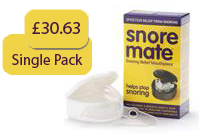Snoring Information - How to stop snoring
Snoring Articles
European Respirative Dentistry - Long term use of Mandibular Advancement http://erj.ersjournals.com//cgi/content/full/17/3/462
Department of Restorative Dentistry, Glasgow Dental Hospital -
Ten year follow up of Mandibular Advancement Devices
http://www.websciences.org/cftemplate/NAPS/archives/indiv.cfm?ID=20081267
Department of Orthodontics - Umea University, Sweden
www.ncbi.nlm.nih.gov/pubmed/11398551
Snoring Information - How to stop snoring
Snoring article From Wikipedia, the free encyclopedia For an updated version with links to citations visit http://en.wikipedia.org/wiki/Snoring Snoring is the vibration of respiratory structures and the resulting sound, due to obstructed air movement during breathing while sleeping. In some cases the sound may be soft, in others loud and unpleasant. The structures are usually the uvula and soft palate.
The irregular airflow is caused by a blockage and usually due to one of the following:
• Throat weakness, causing the throat to close during sleep
• Mispositioned jaw, often caused by tension in the muscles
• Fat gathering in and around the throat
• Obstruction in the nasal passageway
Statistics on snoring are often contradictory, but at least 30% of adults and perhaps as many as 50% of people in some demographics snore. One survey of 5713 Italian residents identified habitual snoring in 24% of men and 13.8% of women, rising to 60% of men and 40% of women aged 60 to 65 years; this suggests an increased susceptibility to snoring as age increases.
Impacts
Snoring is known to cause sleep deprivation to snorers and those around them, as well as daytime drowsiness, irritability, lack of focus and decreased libido. It has also been suggested that it can cause significant psychological and social damage to sufferers. Multiple studies reveal a positive correlation between loud snoring and risk of heart attack (about +34% chance) and stroke (about +67% chance).
Armstrong et al. at the Royal Infirmary of Edinburgh found that snoring strains interpersonal relationships, and concerns for its effects were often voiced above the medical malady. Patients also lamented the social embarrassment arising from complaints when they sleep outside their homes. Both business and holiday arrangements can be detrimentally affected.
Though snoring is often considered a minor affliction, snorers can sometimes suffer severe impairment of lifestyle.
Diagnosis
Usually, snoring is recognized by a friend or partner who observes the patient sleeping. Besides the 'noise' of snoring, more complex conditions such as sleep apnea can be consistent with the symptom of snoring. A sleep study can identify such issues. Patients can also assess their own condition to determine the likelihood of such problems based on the severity of their sleeping difficulties.
Treatment
Almost all treatments for snoring revolve around clearing the blockage in the breathing passage. This is the reason snorers are advised to lose weight (to stop fat from pressing on the throat), stop smoking (smoking weakens and clogs the throat) and sleep on their side (to prevent the tongue from blocking the throat).
Dental appliances
Specially made dental appliances called mandibular advancement splints, which advance the lower jaw slightly, and thereby pull the tongue forward, are a common mode of treatment for snoring. Typically, a dentist specializing in sleep apnea dentistry is consulted. Such appliances have been proven to be effective in reducing snoring and sleep apnea in cases where the apnea is mild to moderate. Mandibular advancement splints are often tolerated much better than CPAP machines. Possible but rare side effects include gradual movement of the teeth, Temporomandibular joint disorder, excess salivation and gum irritation.
Snoring solutions like over-the-counter mandibular advancement splints provide the same benefits if fitted correctly. They are usually made from an EVA polymer and are similar in appearance to protective mouth-guards worn for sports. One disadvantage of the cheaper devices compared to the professionally fitted devices is the difficulty in setting up the correct jaw position. An over-advanced jaw results in jaw joint pain, whilst an under-advanced jaw produces no therapeutic effect. The professionally fitted devices generally incorporate an adjustment mechanism so that jaw advancement can be easily increased or decreased after fitting. To adjust the "do it yourself" appliances it is necessary to reheat them and mold them again in the desired new position. Alternatively, given the low cost, a new splint can be used.
These over-the-counter devices can be purchased at pharmacies in most countries or online.
In the United States, mandibular advancement splints are currently considered class 2 medical devices and cannot be legally sold without a prescription. Americans are, however, allowed to purchase these devices outside the United States and import them for personal use. In Australia, manufacturers can obtain approval from the TGA (Therapeutic Goods Administration) allowing the devices to be sold via normal retail channels without the involvement of a doctor.
Positive airway pressure
A Continuous Positive Airway Pressure (CPAP) machine is often used to control sleep apnea and the snoring associated with it. To keep the airway open, a shoebox-sized device pumps a controlled stream of air through a flexible hose to a mask worn over the nose, mouth, or both.
Surgery
Surgery is also available as a method of correcting social snoring. Some procedures, such as uvulopalatopharyngoplasty, attempt to widen the airway by removing tissues in the back of the throat, including the uvula and pharynx. These surgeries are quite invasive, however, and there are risks of adverse side effects. The most dangerous risk is that enough scar tissue could form within the throat as a result of the incisions to make the airway more narrow than it was prior to surgery, diminishing the airspace in the velopharnyx. Scarring is an individual trait, so it is difficult for a surgeon to predict how much a person might be predisposed to scarring. Some patients have reported the development of severe sleep apnea as a result of damage to their airway caused by pharnygeal surgery. Currently, the American Medical Association does not approve of the use of lasers to perform operations on the pharnyx or uvula.
Radiofrequency ablationis a relatively new surgical treatment for snoring.
This treatment applies radiofrequency energy and heat (between 77°C to 85°C) to the soft tissue at the back of the throat, such as the soft palate and uvula, causing scarring of the tissue beneath the skin. After healing, this results in stiffening of the treated area. The procedure takes less than one hour, is usually performed on an outpatient basis, and usually requires several treatment sessions. Discomfort and pain is usually minimal. Radiofrequency ablation is frequently effective in reducing the severity of snoring, but, often does not completely eliminate snoring.
Bipolar radiofrequency ablation,
a technique used for coblation tonsillectomy, is also used for the treatment of snoring.
Positioning
Snoring can be reduced by changing position on the bed; Sleeping on the side is a possible solution, to avoid rolling back it is possible to place a pillow or a "ball" on the back; raising the head is also another option, useful both while lying on the back or for supporting the head while lying on the side.
Other treatments
Devices such as nose clips can dilate the nostrils and other devices can alter jaw mechanics to keep the jaw in an optimum position. Different aids and practices may work for different people. According to a 2005 article in the British Medical Journal, playing the didgeridoo can also help, as it increases muscle usage in the throat . However, snoring is a recognized medical problem and people who snore should always seek professional medical advice before relying on techniques which may mask symptoms (i.e. snoring) but not treat the underlying condition.



